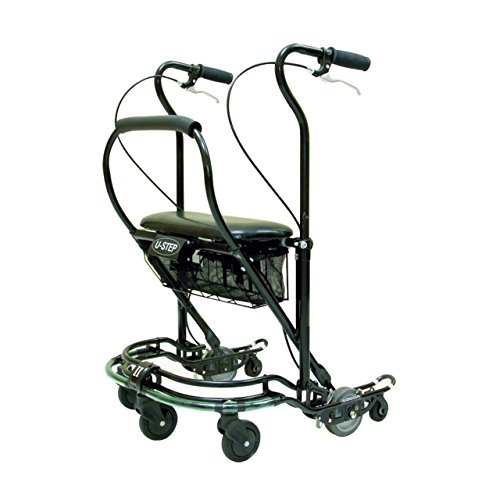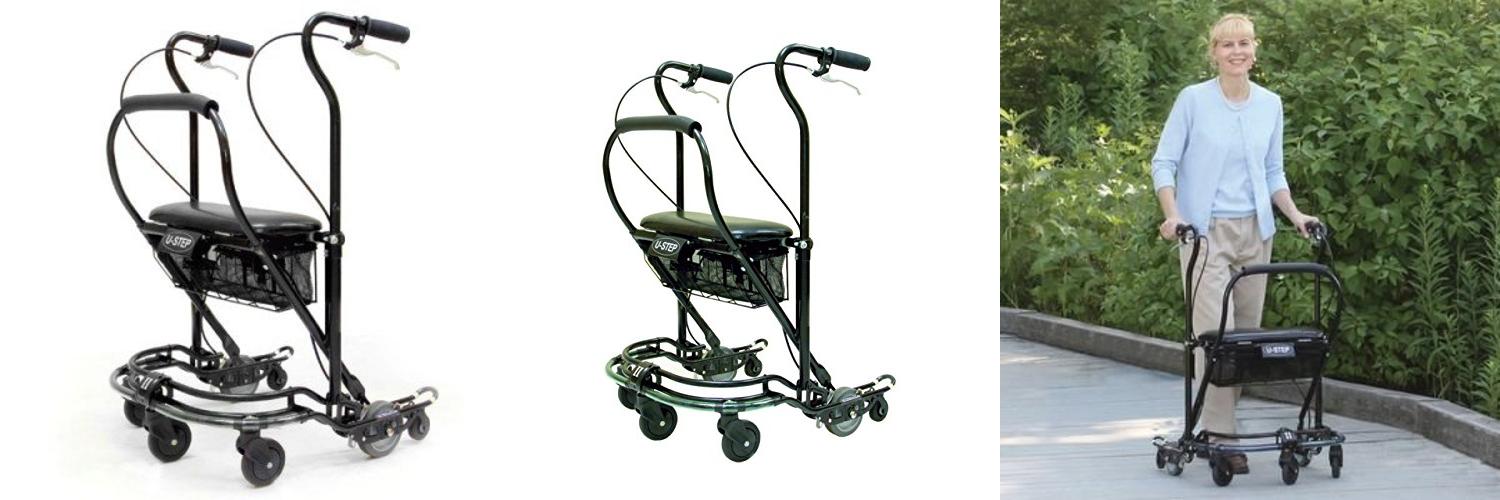Imagine a day where simple steps feel like climbing a mountain. For many living with Parkinson’s disease, this is a daily reality. Parkinson’s can make walking difficult, affecting balance and causing stiffness. This often leads to a need for a walking aid, but choosing the right one can feel overwhelming. You want something that offers support and safety, but also freedom and independence.
Finding the perfect walker isn’t just about picking one off the shelf. It’s about finding a tool that truly helps you move with more confidence and less worry. Many people struggle with knowing what features matter most, or which walker will best suit their specific needs. The wrong walker can be clunky, uncomfortable, or just not provide the right kind of help, leading to frustration.
But what if you could navigate this choice with ease? In this post, we’ll break down what makes a walker great for someone with Parkinson’s. We’ll explore key features to look for, discuss common challenges people face, and offer practical tips to help you find the walker that will make a real difference in your daily life. Get ready to discover how the right walker can help you walk taller and move freer.
Our Top 5 Walker For Parkinson’S Recommendations at a Glance
| Image | Product | Rating | Links |
|---|---|---|---|
 |
Maxi-Aids U-Step Rollator Walker | 9.3/10 | Check Price |
 |
U-Step Walking Stabilizer – Walker – Tall – 6-foot 2 to 6-foot 8 | 8.8/10 | Check Price |
 |
U-Step II Walker Black with Seat | 9.2/10 | Check Price |
 |
Drive Medical 10257BL-1 4 Wheel Rollator Walker With Seat | 9.3/10 | Check Price |
 |
Aliseniors Upright Walker | 9.0/10 | Check Price |
Top 5 Walker For Parkinson’S Detailed Reviews
1. Maxi-Aids U-Step Rollator Walker
Rating: 8.6/10
The Maxi-Aids U-Step Rollator Walker in black is a modern, metal walking aid designed for adults. It boasts a robust 375 lbs weight capacity and can accommodate users with a height range of up to 61 inches. This rollator makes you feel as secure as having someone’s arm to hold onto, offering excellent stability for your daily movements. It comes with a handy seat and basket, perfect for carrying your essentials. Please note that the specific model or color might differ slightly, so always check the title and features carefully before purchasing.
-
What We Like:
- The U-Step Rollator Walker provides exceptional stability, making you feel very secure.
- Its sturdy metal construction ensures durability.
- The built-in seat and basket add convenience for carrying items and taking breaks.
- It supports a high weight capacity of 375 lbs.
- The modern design looks good.
-
What Could Be Improved:
- Potential for slight variations in model or color means buyers must review details carefully.
This rollator walker offers a great combination of stability and convenience. It’s a solid choice for anyone needing extra support and mobility.
2. U-Step Walking Stabilizer – Walker – Tall – 6-foot 2 to 6-foot 8
Rating: 8.7/10
The U-Step Walking Stabilizer – Walker – Tall is a game-changer for taller individuals seeking safe and independent mobility. Designed for those between 6’2″ and 6’8″, this walker offers exceptional stability and ease of use.
What We Like:
- The U-Step walker has a unique 7-wheel design and a U-shaped base, making it incredibly stable.
- It features an innovative reverse braking system that only moves when you pull the lever, which is great for people with Parkinson’s or similar conditions.
- The front wheel has a durable spring system that allows it to roll smoothly over uneven surfaces.
- This walker is designed for easy folding and transport, fitting easily into cars.
- Its narrow width and small turning circle mean it can navigate tight doorways.
- It’s adjustable for tall users, and assembly requires no tools.
- A comfortable seat and backrest provide a place to rest when needed.
What Could Be Improved:
- While designed for stability, the unique braking system might take some getting used to for those accustomed to traditional walkers.
- The specialized design, while beneficial, might mean a higher price point compared to basic walkers.
This U-Step walker empowers taller individuals to move with confidence and maintain their independence. It’s a well-thought-out mobility solution that prioritizes safety and ease of use.
3. U-Step II Walker Black with Seat
Rating: 8.8/10
The U-Step II Walker in black is a fantastic tool for anyone needing extra support and stability. It’s designed to make getting around easier and safer. This walker comes with helpful features like a comfortable seat for resting and a handy basket for carrying your belongings. Plus, it includes a laser light to help you see where you’re going, especially in dimly lit areas. It’s a great option for seniors or anyone looking for a reliable walking aid.
What We Like:
- The built-in seat provides a welcome place to sit and rest whenever you need it.
- The included basket is perfect for carrying groceries, a purse, or other essentials.
- The laser light helps improve visibility and safety, especially when walking at night or in low light.
- It is easy to fold and store, making it convenient for travel or keeping it out of the way.
- The walker feels sturdy and supports you well, giving you more confidence as you walk.
What Could Be Improved:
- The assembly instructions could be clearer for some users.
- While generally easy to maneuver, it can feel a bit bulky in very tight spaces.
- The price point might be a bit high for some budgets.
Overall, the U-Step II Walker is a well-made and helpful product that can greatly improve mobility and independence.
4. Drive Medical 10257BL-1 4 Wheel Rollator Walker With Seat
Rating: 8.6/10
The Drive Medical 10257BL-1 4 Wheel Rollator Walker is a fantastic tool for anyone needing extra support and stability. It’s built with strong steel and offers a comfortable seat, making it perfect for seniors and adults. This walker also has a handy storage pouch underneath the seat for your essentials. Its design is compact, fitting easily into smaller spaces, and it comes in a cool blue color.
What We Like:
- It’s a very stable and strong walker with a comfortable seat.
- The 7.5-inch wheels roll smoothly, even outside.
- You can easily adjust the handle height from 31 to 35 inches.
- The back support can be removed or folded down.
- It folds up easily with one hand and can stand on its own for simple storage.
- It can hold up to 300 pounds.
- It comes with a limited lifetime warranty, so you can trust it.
What Could Be Improved:
- While it folds, it might be a bit heavier than some other walkers for very light transport.
- The storage pouch, while useful, isn’t huge.
This rollator walker offers excellent support and convenience for daily life. It’s a reliable choice for gaining independence and mobility.
5. Aliseniors Upright Walker
Rating: 9.5/10
The Aliseniors Upright Walker is designed to help seniors move with more confidence and comfort. This red walker stands out with its upright design, which means less bending and more support for your back and shoulders. It’s built to make your daily walks easier and safer, whether you’re inside your home or out exploring the neighborhood.
What We Like:
- Its ergonomic design with adjustable, padded armrests helps you stand tall, reducing back and shoulder strain.
- The extra-wide 20.6-inch seat with a backrest offers a comfortable spot to rest, and it’s made with a breathable, soft mesh material.
- Safety is a priority with a sturdy anti-tip frame, reliable hand brakes that can lock the wheels, and reflective strips for better visibility at night.
- The 8-inch solid polyurethane wheels handle different surfaces like grass, gravel, and sidewalks smoothly, and the 360-degree front wheels make turning easy.
- It’s lightweight at just 18.76 pounds, folds easily for storage and transport, and requires no tools to assemble.
- Convenient features include a detachable storage bag that can be used as a backpack and a removable holder for a cane or umbrella.
What Could Be Improved:
- While it’s designed for maneuverability, the maximum width of 28.7 inches might still be a tight fit for some narrower doorways or tight spaces.
This walker truly makes a difference for seniors seeking independence and ease of movement. It’s a smart investment for a more active and comfortable lifestyle.
Choosing the Right Walker for Parkinson’s: A Comprehensive Guide
Living with Parkinson’s disease can bring challenges, and a walker can be a great tool to help maintain independence and safety. Finding the right walker is important for comfort and effectiveness. This guide will help you navigate the options and make an informed decision.
Key Features to Look For
When selecting a walker for Parkinson’s, several features stand out.
- Stability and Support: Look for walkers with a wide base. This offers more stability. Four-legged walkers, also called standard walkers, provide a good foundation.
- Brakes: Easy-to-use, reliable brakes are crucial. Hand brakes are often preferred. They allow for quick stops, especially on inclines or when needing to rest.
- Adjustable Height: The walker should be adjustable to your specific height. This ensures proper posture and reduces strain. The handles should be at hip level when you stand upright.
- Wheels: Two-wheeled walkers offer more mobility. However, ensure the wheels are smooth-rolling and don’t snag easily. Some walkers have larger wheels that handle uneven surfaces better.
- Seat and Backrest (Optional): If you need to rest frequently, a walker with a built-in seat and backrest can be very helpful. Make sure the seat is comfortable and sturdy.
- Weight Capacity: Check the walker’s weight limit to ensure it can safely support the user.
Important Materials
The materials used in a walker affect its durability, weight, and overall quality.
- Aluminum: Most walkers are made of aluminum. It’s lightweight, which makes them easier to maneuver. It also resists rust.
- Steel: Steel walkers are generally heavier but can be more durable. This might be a good option if the user needs extra sturdiness.
- Plastic: Plastic is often used for grips, wheels, and sometimes seats. High-quality, durable plastic is important for longevity.
Factors That Improve or Reduce Quality
Several factors influence a walker’s quality and user experience.
- Build Quality: A well-built walker will feel solid. Check for loose parts or wobbly connections. Good welds and sturdy joints indicate better quality.
- Ease of Folding: If you need to transport or store the walker, an easy-to-fold mechanism is a big plus. Some walkers fold with a simple push of a button.
- Grip Comfort: The handles should be comfortable to hold for extended periods. Padded or ergonomic grips reduce hand fatigue.
- Maneuverability: How easily the walker turns and navigates tight spaces is key. Smooth-rolling wheels contribute to good maneuverability.
- Durability: A high-quality walker will last a long time. Look for sturdy materials and robust construction.
User Experience and Use Cases
The best walker is one that fits the user’s daily life and needs.
- Daily Mobility: Walkers are excellent for everyday tasks like walking around the house, going to the mailbox, or moving between rooms.
- Shopping and Errands: For those who still enjoy going out, a walker can provide the necessary support and a place to rest if needed.
- Balance and Fall Prevention: The primary benefit is improved balance and reduced risk of falls. The walker offers an extra point of contact with the ground.
- Independence: By providing safety and support, a walker helps people with Parkinson’s maintain their independence and continue engaging in activities they enjoy.
Frequently Asked Questions (FAQ)
Q: What is the most important feature in a walker for Parkinson’s?
A: Stability and reliable brakes are the most important features. They help prevent falls and provide confidence.
Q: Can I use any walker for Parkinson’s?
A: While many walkers can offer support, those designed for Parkinson’s often have features like better braking or stability that are specifically helpful.
Q: How do I know if the walker is the right height?
A: When you stand upright with the walker in front of you, the handles should be at hip level. Your elbows should have a slight bend.
Q: Do I need wheels on my walker?
A: Two-wheeled walkers offer more mobility. However, if you find it hard to control, a standard four-legged walker might be safer.
Q: What if I need to rest often?
A: Look for a walker with a comfortable seat and backrest. This allows you to take breaks whenever you need them.
Q: How do I clean my walker?
A: Most walkers can be cleaned with mild soap and water. Wipe down the frame and handles regularly. Check the manufacturer’s instructions for specific care.
Q: Can a walker help with tremors?
A: While a walker doesn’t stop tremors, the added stability can make it easier to move and perform tasks, potentially reducing the impact of tremors on mobility.
Q: Should I get a walker with a basket?
A: A basket can be very convenient for carrying personal items, but make sure it doesn’t unbalance the walker when full.
Q: Where is the best place to buy a walker?
A: You can find walkers at medical supply stores, pharmacies, and online retailers. Trying one out in person is often recommended.
Q: How often should I replace my walker?
A: Replace your walker if it becomes damaged, wobbly, or if your needs change. Regular checks for wear and tear are important.
In conclusion, every product has unique features and benefits. We hope this review helps you decide if it meets your needs. An informed choice ensures the best experience.
If you have any questions or feedback, please share them in the comments. Your input helps everyone. Thank you for reading.

I’m the recipe developer and food photographer behind Air Fryer at Tiffany’s. I’m also a wife, mom to two adventurous little boys, registered nurse, and live in the great Midwest. Join me as I show you new ways to use your air fryer that you never knew possible.
